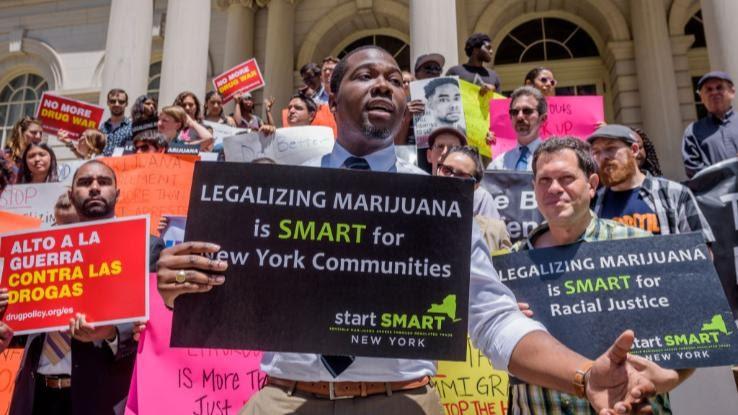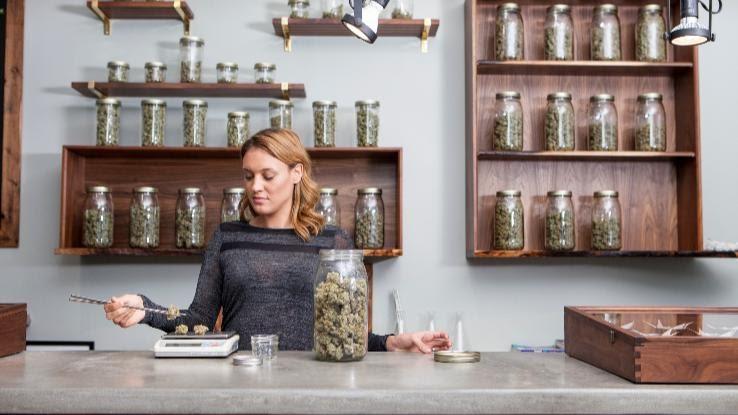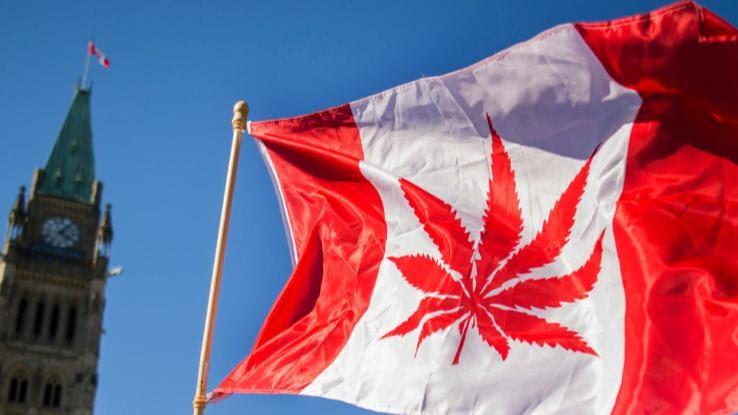Gta 5 Easy Rider Captain America Bike Build

A little over two decades ago, cannabis was an illegal drug across the board in the United States, both federally and at the state level. While the federal government still hasn't legalized marijuana and still treats it as a controlled substance — a drug or chemical the government regulates under the premise that it has potential for abuse or addiction — many state governments have largely approved both therapeutic and recreational usage of the drug. States where the use of cannabis in any form remains entirely illegal are now in the minority. During the November 2020 elections, New Jersey, Arizona, South Dakota and Montana voted to legalize the recreational use of cannabis for adults over age 21, and South Dakota and Mississippi also voted to approve the medicinal use of cannabis.
In 2021, New York and Virginia joined the growing group of states that have legalized cannabis for recreational use. With only a handful of states that have not made any legalization steps at all, the future of cannabis seems bright and green. Cannabis is finding its way into TV shows, sports, and other household names.
With most states having legalized the use of cannabis in some capacity, it's clear that the general public's view of marijuana has evolved dramatically since the days when now-hilarious propaganda films like Reefer Madness warned the U.S. population of the plant's "deadly" effects. In the ensuing decades we've learned a lot more about the many medical benefits linked to this once-taboo treatment. But as its use becomes even more widespread and as pushes for federal decriminalization may start to ramp up, it's becoming increasingly important, too, to take a look at what the future holds for cannabis in the United States.
How Have Attitudes Toward Cannabis Changed?
Widespread acceptance of the medical and social benefits of cannabis use is a relatively new concept in the United States. Although early colonists were once encouraged and eventually legally required to grow hemp (a type of cannabis used to make paper, fabric and other products), it fell out of favor once cotton production increased — and as the populace realized the plant's psychoactive effects were as potent as its economic ones. Beginning in the 1800s, cannabis was used in medicinal tinctures and other pharmaceutical preparations and was widely available for purchase in general stores. This consumption lasted until the 1930s when, following Prohibition, politicians and other groups used racism and biases based on socioeconomic status to justify the criminalization of the drug.

Despite restrictions and legal ramifications, cannabis slowly made its way into middle-class American life in the mid-20th century, and this spurred gradual changes. America's attitude towards cannabis began to relax again in the 1970s when Oregon became the first state to decriminalize the drug. While decriminalization didn't make marijuana use legal, it did limit penalties for those charged with possession of cannabis for personal use. Rather than serve jail time, which was previously the punishment they faced, people who were caught with up to an ounce of cannabis were instead fined $100 for possession.
A number of other states followed suit, and by 1977, President Jimmy Carter had begun pushing Congress to decriminalize the drug, pointing out that anti-cannabis laws were doing more harm to society than cannabis itself. Nonetheless, conservative politicians, law enforcement officers and various social groups opposed decriminalization efforts, and cannabis was included on the list of illicit substances that President Ronald Reagan's War on Drugs sought to eliminate during the 1980s.
It wasn't until 1996 that California became the first state to legalize cannabis for medicinal purposes with its Compassionate Use Act of that same year. By the end of the 1990s, Alaska, Oregon, Washington and the District of Columbia had also legalized cannabis for people who received prescriptions from licensed physicians. Then, during the 2000s, eight more states passed medical cannabis laws without descending into chaos, which may have helped ease the public's apprehension.
By the 2010s, U.S. voters were starting to seriously rethink whether cannabis was the "gateway drug" that many during the Reagan era had believed it to be. In 2012, Colorado and Washington became the first states to allow adults to legally purchase cannabis for recreational purposes. Presently, 18 states plus Washington D.C. have legalized recreational cannabis, while it's legal for medical use in the remaining 32 states and D.C.
While the United States has come a long way in legalizing cannabis, it's still not quite as accepting as a number of other countries. Canada, for instance, legalized recreational cannabis at a federal level in 2018, following the lead of Uruguay, which became the first country in the world to legalize the plant for recreational purposes and sales in 2013.

Mexico is poised to legalize cannabis on a recreational level. In March 2021, Mexican Congress passed a legalization bill. What happens next is that the bill will go to Mexico's Senate and if the bill is passed there, it goes to Andrés Manuel López Obrador, the President of Mexico. With both of its nearest neighbors going legal, could the U.S. be next?
While the majority of U.S. states have at least legalized medicinal cannabis at the state level, the drug still remains illegal under federal law. That said, it may not be forever, as bills like the (MORE) Act are often under review by Congress. If passed, this bill would effectively make cannabis legal at the federal level by decriminalizing its manufacturing, distribution and possession and by removing it from the Controlled Substances Act, which classifies and regulates prescription and other drugs.
Unfortunately, the bill is not without its issues, as it wouldn't prohibit individual states from punishing offenders for cannabis-related crimes if those states elected to do so. That said, it would be a first step in helping to put the country on a more progressive track and bridge the gap between the United States and the more than 30 countries around the world that have legalized cannabis for medicinal purposes. Many hope that President-Elect Joe Biden will help usher in an age of cannabis reform as his presidency progresses. While new changes from the incoming administration likely wouldn't result in across-the-board approval for recreational use, Biden has expressed his support for both the decriminalization of the drug as well as the expunging of criminal records for people who have been convicted of cannabis-related crimes. Biden, along with Vice President-Elect Kamala Harris, also supports medicinal legalization on the federal level. Vice President-Elect Harris is even among the co-sponsors of the Marijuana Justice Act of 2019, which aimed to remove the drug from the federal list of controlled substances.
In addition to support for decriminalization at the highest level of the U.S. government, Congress also continues pushing for reform. In early December of 2020, the House of Representatives passed a landmark bill to "decriminalize marijuana and expunge nonviolent marijuana-related convictions." While much of the House of Representatives is on board with cannabis legalization, there are obstacles to overcome in the Senate, where The New York Times notes that the bill is "almost certainly doomed." Senate Majority Leader Mitch McConnell has long expressed that a number of conservative Senate members are hesitant to proceed with federal decriminalization, a stance that presents a substantial roadblock to progress.
The List of Cannabis Health Benefits Continues Growing
As the country becomes more open-minded about the use of cannabis, studies are consistently revealing the plant's incredible number of medicinal benefits. According to Harvard Medical School, the use of cannabidiol, or CBD, extracts — the non-psychoactive chemical compounds in marijuana that don't cause the drug's famed "high" — can provide relief for an impressive number of conditions and symptoms such as insomnia, anxiety, pain and epilepsy. Unlike THC, which is the chemical compound that causes the "high" associated with marijuana use, CBD extracts cause very little to no change in consciousness.

While THC-containing variants of marijuana products see frequent recreational use, Harvard Medical School also notes that cannabis is becoming a popular treatment for management of chronic pain. As Dr. Peter Grinspoon, author of the Harvard article, explains, "Part of [marijuana's] allure is that it is clearly safer than opiates (it is impossible to overdose on and far less addictive) and it can take the place of NSAIDs such as Advil or Aleve, if people can't take them due to problems with their kidneys or ulcers or GERD."
Other studies are revealing that cannabis can also help treat high blood pressure, serve as a natural muscle relaxant and help regulate blood glucose and metabolism for people living with diabetes. Cannabis has also been used to help reduce nausea, promote sleep and limit inflammation. Yet another study indicates that CBD may reduce age-related bone loss due to osteoporosis and assist in bone remodeling — a lifelong process that helps healthy new bone tissue develop.
Pop Culture and the Normalization of 4/20?
As cannabis in America continues to gain widespread acceptance in society, it's likely that researchers will initiate and engage in further studies to unlock cannabis' true potential for therapeutic use. CBD products are now available in a variety of forms, ranging from edible items and drinks to oils, tinctures and capsules.

Popular culture continues to further embrace cannabis to the point of approaching normalcy. With nearly 90% of states at least on the path to legalization, whether through decriminalizing cannabis or embracing medical cannabis in some capacity, normalization seems inevitable for cannabis in the future.
Professional sports are starting to ease up on rules against cannabis. TV shows that are not specifically about cannabis like Broad City, American Dad, and even 13 Reasons Why feature cannabis regularly and casually across multiple episodes. American treasures like Willie Nelson have praised cannabis and moguls like Elon Musk can ingest cannabis on a podcast and later become one of the richest men on the planet. Over on Discovery Plus, you can even watch Chopped 420 (pictured above), the first cannabis cooking show for such a large audience.
Despite the newfound acceptance of cannabis, it is important to remember that there are still thousands of people serving prison sentences for cannabis-related offenses. As far as what the future of cannabis goes, there is proven space for business, for technology, for venture, and even creativity. There also needs to be room for advocacy until reform and equity accompany legalization efforts.
Many folks who could have initially capitalized on legalized cannabis were put in jail for it, as with many who would have been able to enjoy its recreational potential. The path to equity on this issue may take longer than it will take to legalize cannabis. As the population continues to enjoy the benefits of medical and recreational benefits, it's important to remember that we are able to so thanks to laws that people fought hard to pass.
Source: https://www.ask.com/culture/cannabis-use-in-america?utm_content=params%3Ao%3D740004%26ad%3DdirN%26qo%3DserpIndex&ueid=c31a2ea9-d42c-446c-82ea-ae0a7b17a668
0 Response to "Gta 5 Easy Rider Captain America Bike Build"
Post a Comment